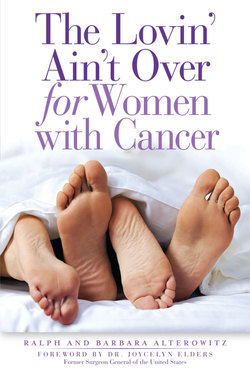Читать книгу The Lovin' Ain't Over for Women with Cancer - Ralph Alterowitz - Страница 20
На сайте Литреса книга снята с продажи.
Chapter 3 Cancer Therapy and Its Consequences
ОглавлениеI had a mastectomy and chose reconstruction with a matching augmentation on the other side. Now I don’t get aroused when my husband touches the mastectomy breast because I don’t’ have feeling in that breast. The good news is that I am now a proud C cup woman, and there are many other ways to get me going.
Amanda
Ever since both of my ovaries were removed, intercourse has become painful. I don’t know yet if it will get better with time. My boyfriend is fine with not having intercourse - now we have oral sex. We have gone from one kind of boring to another kind of boring, because we always do things the same way.
Liz
My melanoma is being treated with Interferon. I know that’s one of the most aggressive treatments, but that’s what I need for my aggressive cancer. That thing has knocked the wind out of my sex life. I am not interested at all. I just let my husband do his thing, but it doesn’t do anything for me. It must be hard for him—he loves me so much, he takes care of me, he gives me the shots that he knows hurt and make me feel miserable, and our sex life is reduced to pump and dump. This stinks!
Carol
In some situations, not knowing what to expect can be exciting. But where health is concerned, people naturally become fearful. For a woman with cancer, the diagnosis is often terrifying. That’s because just a few decades ago, a diagnosis of cancer was most often considered a death sentence.
For many people, having cancer in the 21st century means having a chronic disease, much like heart disease or diabetes: one that requires monitoring and management. Unfortunately, doctors often do not talk about what monitoring and management consist of: the ongoing course of tests and treatments that can dominate life for some period of time. They are usually quick to say, “We can treat you.” They less often say, “We can cure you.” There is usually not much talk about how the therapy will affect your daily life, whether you will be able to do everything you did before or what adjustments and compromises you will have to make to cope with your new reality.
Rarely do doctors talk about the impact of cancer on your intimacy and sexuality, a key part of quality of life. When the primary concern is with surviving and getting through the treatment, this is understandable. Thoughts about what life will be like after treatment are not top-of-mind. Staying alive is all that matters. But the fact is that the vast majority of patients will live a long time.
After decades of focusing on diagnosis, treatment, and cures, health care professionals are now more concerned than before with the phase called “survivorship.” Part of this is the totality we call “quality of life.” Quality of life is greatly affected by the choices made in treating the disease. When there are options, it is important that you know the quality-of-life consequences of each option. This chapter will outline various therapy choices for many different types of cancer, with special consideration given to the sexual side effects of various therapies.
Many side effects of various therapies have been well described. This is not the case for the effects on sexuality. The tables presented at the end of this chapter link therapies with their most common sexuality-related biological and psychological effects and the resulting emotions experienced by those in treatment and their partners. The tables only provide highlights, and are designed to be a general reference.
Table 1 lists some common treatment options for many cancers. They are listed here to provide a reference, not as a basis for deciding between treatments. As might be expected, each treatment has both advantages and undesirable side effects. Subsequent tables focus on their impact on sexuality.
Table 2 highlights the sexuality-related biological and psychological effects of different cancers and their treatments.
Table 3 shows the frequency of various sexual side effects.
Table 4 notes major emotions that the cancer patient and partner may experience.
Table 5 presents some common actions of women cancer sufferers and their partners. These actions can have a negative effect on the degree of success and the level of satisfaction that couples can achieve in renewing sexuality after cancer. Being alert to such negative behaviors may enable patients and their partners to conduct themselves differently and instead take the positive actions outlined in the remainder of this book.
